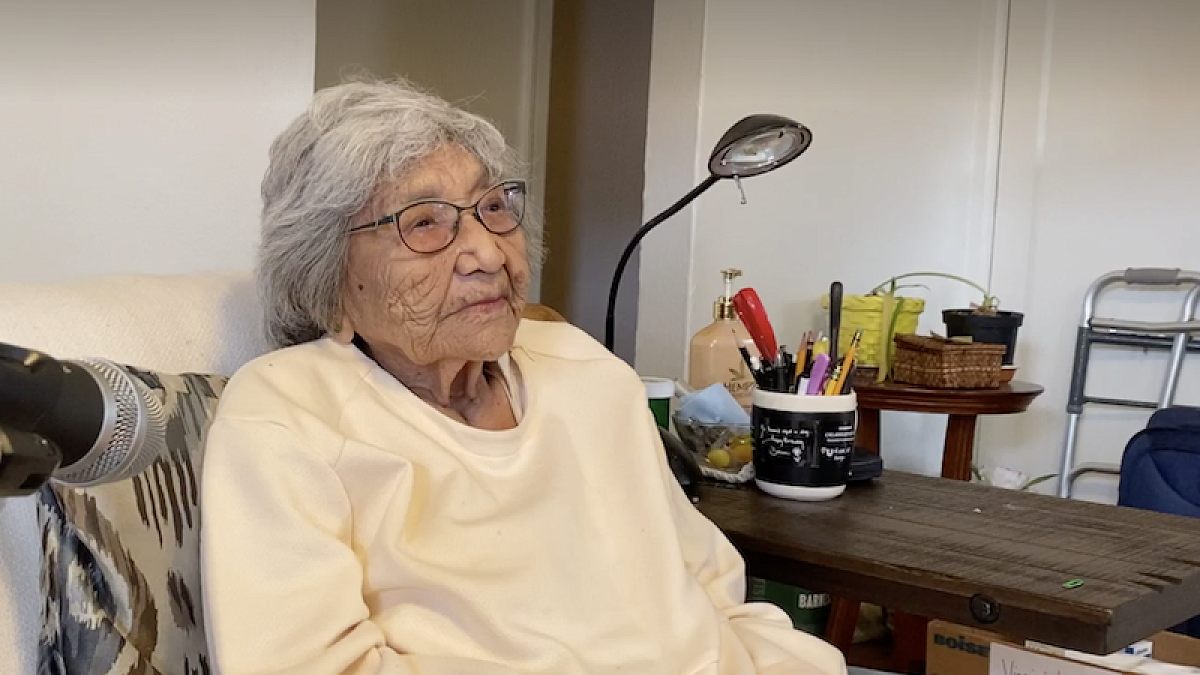A Yakama Nation elder and language teacher who was the University of Oregon’s oldest-ever graduate will reach a major milestone next week.
“I never dreamed that I would live this long,” said Virginia Beavert, who turns 100 on Nov. 30. Beavert, who is also known as Tuxámshish, earned a doctorate in linguistics from the UO at age 90 and has remained active in teaching and mentorship at the UO’s Northwest Indian Language Institute and the Sapsikwala teacher education program.
Beavert’s centennial is being celebrated with in-person and online gatherings, bringing together the UO community with members of the Yakama Nation, colleagues, fellow veterans and others. The Ichishkíin language class at the UO will host a Zoom gathering Nov. 29, which will include video greetings collected at UO and the Yakama Nation, and a recent video interview of Beavert.
On Nov. 30 from 1 to 3 p.m., Beavert will be at a reception outside the Northwest Indian Language Institute building attended by the UO’s president and provost, Yakama representatives, veterans groups and UO students and faculty members. Members of the community are invited to walk, drive, dance or sing as they pass by the building located at 1629 Moss St. in a socially distant honor to Beavert.
“It’s important for us to be recognized on this campus,” Beavert said. “The tribes are sending their young people here to learn.”
Once an instructor of UO’s Ichishkíin class, Beavert now mentors its instructor and students, attending class weekly before the pandemic. She also mentors Native and non-Native students in UO’s Sapsikwala teacher education program, UO Teach and other related disciplines, and advises students through the Many Nations Longhouse.
She has been a keynote speaker at the UO’s Native student graduation several times, focusing her message on the responsibility and privilege of returning institutional knowledge to tribal communities.
Before Beavert became a mentor to students, she relied on them herself when she became a nontraditional student in her 40s, earning a bachelor’s degree in anthropology at Central Washington University, and later a master’s degree in bilingual education at the University of Arizona. Beavert said being an older student wasn’t always easy, and she encourages admirers to study hard when they’re still young.
Beavert began her education after serving in the Women’s Army Corps in New Mexico during World War II. But long before that, as a young teenager, Beavert worked with anthropologist Melville Jacobs, who became interested in Beavert’s fluency in the language and culture of not just her Yakama tribe but also neighboring Salish tribes.
Being away from her family for three years during the war, Beavert began to lose her Yakama language. She remembers calling home from New Mexico when her mother was talking too fast for her to understand.
“She yelled at me over the phone: ‘What’s the matter with you!’” Beavert recalled. “Just think, in three years I forgot my language. This is the way it is. The children, when they’re taken away from their reservation, lose their language if they don’t have someone to speak to.”
When Beavert returned from her military service, she promised to help her stepfather finish his work on recording the Ichishkíin language.
She has since published their Ichishkíin, also called Sahaptin, dictionary and others, as well as a collection of Yakama legends and stories, “Anakú Iwachá (The Way it Was)” and “The Gift of Knowledge/Ttnúwit Átawish Nch'inch'imamí: Reflections on Sahaptin Ways,” a book based on her doctoral dissertation that includes highlights from her own life and cultural teachings. Beavert was also the first woman to be elected to the Yakama Nation general council and served from 1974-85. She has received numerous fellowships, awards and honors for her cultural work.
Beavert said her mother would have been incredibly proud to see her earn her doctorate, but her stepfather encouraged her teaching more than anyone.
“He told me, ‘Teach anyone who enrolls in your class,’” she said. “I know lots of times the tribe might criticize you if you’re teaching non-Natives. But just think, one day they might be the president.”
Written birthday greetings can be dropped off at the longhouse, which is preferred, or emailed to nwili@uoregon.edu.
—By Anna Glavash Miller, College of Arts and Sciences


